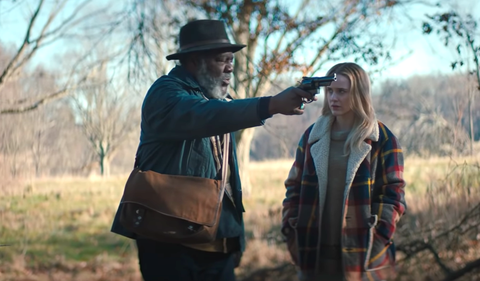Wives in crime films have had a notoriously rough go of it. Just ask Kay Adams, wife of Mafia don Michael Corleone for half The Godfather trilogy. Though she’s promised throughout the first Godfather that her husband will leave organized crime for a life of legitimacy, Kay’s hopes are dashed in the film’s closing moments, when she’s literally and figuratively cut off from Michael’s business by a door closing in her face. I’m Your Woman, a new crime film starring Rachel Brosnahan, opens up where that door closed. The opening minutes contain a scene deliberately evocative of The Godfather: Jean, a bored wife who’s kept in the dark by her criminal husband Eddie, watches as Eddie’s business partners fill up her home, only to have a door shut in her face. This time, though, we stay on her side of the door.
Jean never sees Eddie again after that. Well, maybe she does, but we don’t: I’m Your Woman puts us in the shoes of the archetypal crime wife by hiding information from us, the first of many clever structural maneuvers by screenwriters Julia Hart and Jordan Horowitz. From its first scene, I’m Your Woman dispenses information in a certain rhythm, giving us crumbs of context here and there before cutting to somewhere entirely different without explanation. It feels like Jean feels, like we’re only privy to the small stuff because the truth is ostensibly too much for us to handle. But when Jean is woken up in the middle of the night by Eddie’s friends and told to get to a safe location ASAP, she starts to develop an appetite for the truth—especially because she has an infant son to keep safe.
There are two things that I’m Your Woman does extraordinarily well, the first being Aska Matsumiya’s score. It sounds immediately recognizable, not because it’s familiar, but because it’s already one of the all-time great noir scores—so intriguing and slyly expressive that there’s no way it hasn’t gone down in history already. Between I’m Your Woman and the underseen Selah and the Spades, Aska has announced herself as a sonic interpreter of genre not to be ignored. The movie’s other advantage is the sheer, undeniable cuteness of Jean’s baby, perhaps the only human child to edge out cinema’s long history of baby animals for most adorable sidekick. No other stakes are needed, really; the thought of anything happening to that baby put me on the edge of my seat.
The music and the baby may be the movie’s MVPs, but Julia Hart’s direction is close behind. I’m Your Woman goes to many strange places but never loses its identity, largely because Hart makes each twist and turn work within the film’s singular rhythm. She makes the flow of “withhold information, smash cut to elsewhere” function in a number of different ways. Building tension? The scene is quiet and still, the camera refusing to show us the corners from where danger could spring—cut to an unexplained sign of danger! Instant anxiety. Developing character? Obscure the method by which Jean could pull something off; smash cut to her pulling it off without explanation. Jean’s got some grit. No matter what the movie’s doing, it never stops generating the feeling that we’ve been thrown into a world without context but are cutting through it anyway. Jean’s atmosphere is made our own through Hart’s tricks of the trade. Given the 70s setting, it could be a metaphor for the feminist movement’s determination to help women succeed in a world that wasn’t built for them; or it could be a tighter approach to the oft-exposition-laden crime genre. Either way, it works.
Or at least it does for a while. The movie’s trademark restraint doesn’t work so well when it comes to its plot twists, fairly significant reveals that land with the impact of a hairpin. The lack of fuss over what should be life-altering information to Jean and her allies is a little deflating, even if it aligns with the theme of pressing forward no matter what you know and what you don’t. It makes the film’s second half, in which the scales tip a bit from intrigue to answers, less interesting than the mystery of the first half. But the twists always show on Brosnahan’s face. She has to plumb a number of emotional depths for this role—all while keeping it together for the sake of survival—and she does with so aplomb, particularly when she’s safe enough to let her guard down. In terms of artists in front of the camera, she’s the film’s biggest asset—well, biggest adult asset, anyway.
★★★½ (3.5/5)




